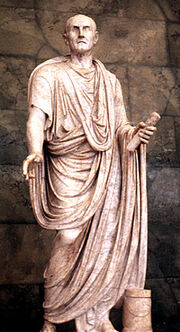- For the category list, see Senators.

Statue of Senator with toga and scroll.
Senators were members of the perpetual council of elders of the Roman Republic, and at first consisted only of one hundred Senators chosen from the Patricians. They were called Patres, either on account of their age or the paternal care they had of the state. The word senate derives from the Latin word senex, which means "old man". Therefore, senate literally means "body of old men." The composition of the Senate was determined at every five-year census by the Censors, who typically would add every man who had held a magistrate's office not already a Senator, and remove those who had fallen beneath the property requirement for membership in the equestrian class or acted in ways contrary to the requirements of the status of Senator, such as engaging in trade. Once named to the Senate, therefore, Senators would typically maintain the status for life, and were ideally situated to position their sons for the magistracies which would make their status quasi-hereditary. The membership of the Senate thus expanded steadily throughout the Republic.
The Senate had one absolute power, control of the Roman treasury, but beyond that held the persuasive power of senatum consultum, the advice of the Senate, which bore the authority of the most experienced and influential citizens of the state, to the magistrates or the civic Committees . The Senate therefore could not by itself pass law or declare, which powers belonged to the Committee of Tribes, the Committee of Plebians and the Committee of Centuries, but actions endorsed by the Senate were routinely endorsed by the appropriate Committees. In emergency, the Senate also could recommend the appointment of a dictator, investing one man with nearly total control over the state.

